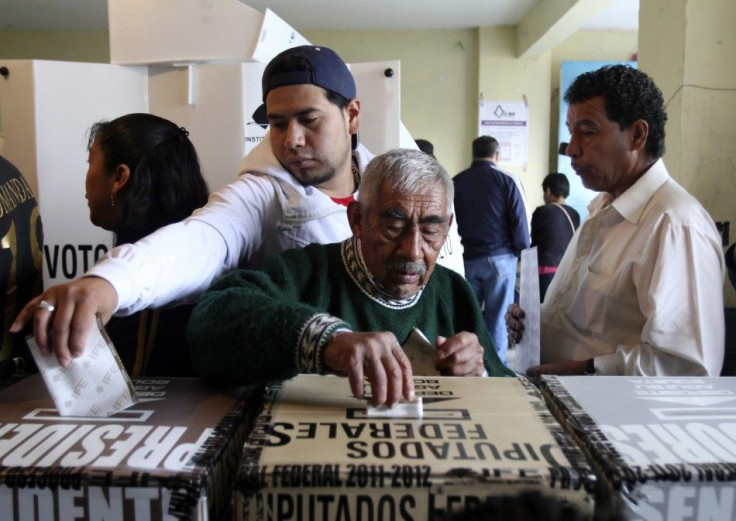Voting Begins In Mexico; PRI Victory Expected

Mexicans voted in presidential, congressional and state elections Sunday, with the party that ruled for most of the past century poised for comeback after 12 years out power.
The savage drug war and weak economic growth have worn down the ruling conservatives.
Election officials solemnly looked on as a giant red, white and green national flag was hoisted in Mexico City before polls opened at 8 a.m. (9 a.m. EDT). The first national exit polls are expected when voting ends in the westernmost part of the country, Baja California, 12 hours later, Reuters reported.
Twelve years after the Institutional Revolutionary Party (PRI) lost power, polls show its candidate, Enrique Pena Nieto, heading into the vote with a double-digit lead over his opponents, Andres Manuel Lopez Obrador and Josefina Vazquez Mota, despite lingering doubts about the party.
Tainted by corruption, electoral fraud and occasional bouts of brutal repression during its 71 years in power, the PRI was voted out in 2000. But it has bounced back, helped by the economic malaise and a tide of lawlessness that have plagued Mexico under the conservative National Action Party, or PAN.
After ending the PRI's rule in 2000, the PAN raised hopes of a new dawn for democracy in Mexico. But years of weak growth and the death of more than 55,000 people in drug-related killings since 2007 have eroded its popularity.
Reports of more violence continued ahead of Sunday's vote.
In the Pacific beach resort of Acapulco, one of the cities worst-affected by the scourge, four people were reported murdered on Saturday. A local mayoral candidate was kidnapped and accusations of vote fraud flew, local media said, according to Reuters.
Pena Nieto, the handsome, youthful ex-governor of the State of Mexico, has stepped into the breach, establishing himself as the new face of the PRI with the aid of favorable media coverage led by Mexico's most powerful broadcaster, Televisa.
Bidding to become the country's first woman president, PAN candidate Vazquez Mota lags at third in the polls, and Pena Nieto's closest challenger, former Mexico City Mayor Lopez Obrador, is also burdened by his past.
The front-runner for much of the 2006 race, Lopez Obrador ultimately lost by half a point to President Felipe Calderon of PAN and refused to accept defeat.
Claiming fraud, he led massive protests in the capital for weeks, bringing much of Mexico City to a standstill and alienating even some of his supporters.
All of the parties are accusing rivals of emulating the traditional PRI tactic of offering voters money, food or benefits in return for votes, the Associated Press reports. Lopez Obrador's Party of the Democratic Revolution (PRD) says Pena Nieto's campaign has handed supporters prepaid money cards worth more than 70 million pesos ($5.2 million).
Where do they get so many resources to conduct the PRI campaign, so many billboards? asked voter Marilu Carrasco, a 57-year-old actress who was lined up to cast her vote for Lopez Obrador in southern Mexico City's Copilco neighborhood. The PRI's return to the presidency could be the worst thing that could happen to us, Carrasco said.
PRI activists, meanwhile, have published photographs of truckloads of handouts they say were given out by Democratic Revolution backers.
At some of the special polling stations set up in Mexico City for voters to cast ballots away from their hometowns, people complained that the limited number of ballots allotted had run out just a few hours after the station opened.
Electoral officials have repeatedly insisted that outright fraud -- a routine feature of the PRI regime for decades -- is now almost impossible under the country's elaborate, costly electoral machinery.
Benito Nacif, an adviser at the country's Federal Electoral Institute, or IFE, the body responsible for organizing the multiple elections taking place on Sunday, told Britain's Financial Times in an interview that all measures were in place to ensure a free, fair and efficient process.
We have a very trustworthy and accurate electoral list, he said in reference to the 79.5 million names that appear on the national register. Much more so than in previous elections.
Nacif also said the IFE had trained more than a million citizens to help monitor the voting process in each of the roughly 143,000 voting stations. The political parties supervised that training process, so there is absolutely no bias ... it is a very transparent process, he said.
IFE has also taken steps to simplify the calculations that officials at each voting station must carry out to tally the number of votes. Under new laws, the country's 300 voting districts must perform a recount in the event that the winning candidate in that district triumphs by less than 1 percentage point.
Final polls showed Pena Nieto winning 40 percent to 45 percent of the vote, Lopez Obrador close to 30 percent with Vazquez Mota not far behind. Gabriel Quadri, a fourth candidate competing for a smaller party, is expected to pick up a few percent. The one with the most votes wins, with no need for a second round.
The polls are manipulated, said López Obrador supporter María Guadalupe García told The Guardian. If the PRI wins it will be because of the party machine that takes advantage of the poverty and ignorance of the people, rather than an informed and reasoned vote.
In recent weeks López Obrador has filled his speeches with assumptions of victory, leading to accusations from the PRI that he is preparing to contest a loss again.
Besides choosing a president for a single six-year term (the constitution bans re-election), Mexicans will elect the upper and lower houses of the national congress. There are also six governorship races, the election for the mayor of Mexico City, and hundreds of other local offices on the ballot .
© Copyright IBTimes 2024. All rights reserved.











